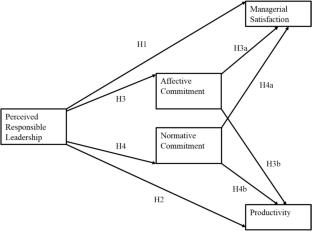Responsible leadership in creating socially responsible business through impacting micro employee outcomes
Abstract
Drawing from the social learning and self-determination theory, we investigated the employee outcomes resulting from the perceived responsible behaviour of their leaders in the organisations through affective and normative commitment as a mediator. The proposed hypotheses were tested using structural equation modeling and followed two steps. The researchers administered the survey to collect data targeting 370 Indian middle-level managers working full-time. The study revealed that perceived responsible leadership considerably influences employee satisfaction and productivity. Furthermore, along with the direct significant relationship among perceived responsible leadership, employee satisfaction, and productivity, the results also indicated the presence of an indirect effect. This research guides new-age leaders on inducing employee productivity and satisfaction by leading responsibly and enhancing their affective and normative commitment. This study uniquely contributes to responsible leadership literature by linking it with self-determination theory. This study uniquely extends the limited understanding of responsible leadership and its relationship with employee satisfaction and productivity.


 求助内容:
求助内容: 应助结果提醒方式:
应助结果提醒方式:


